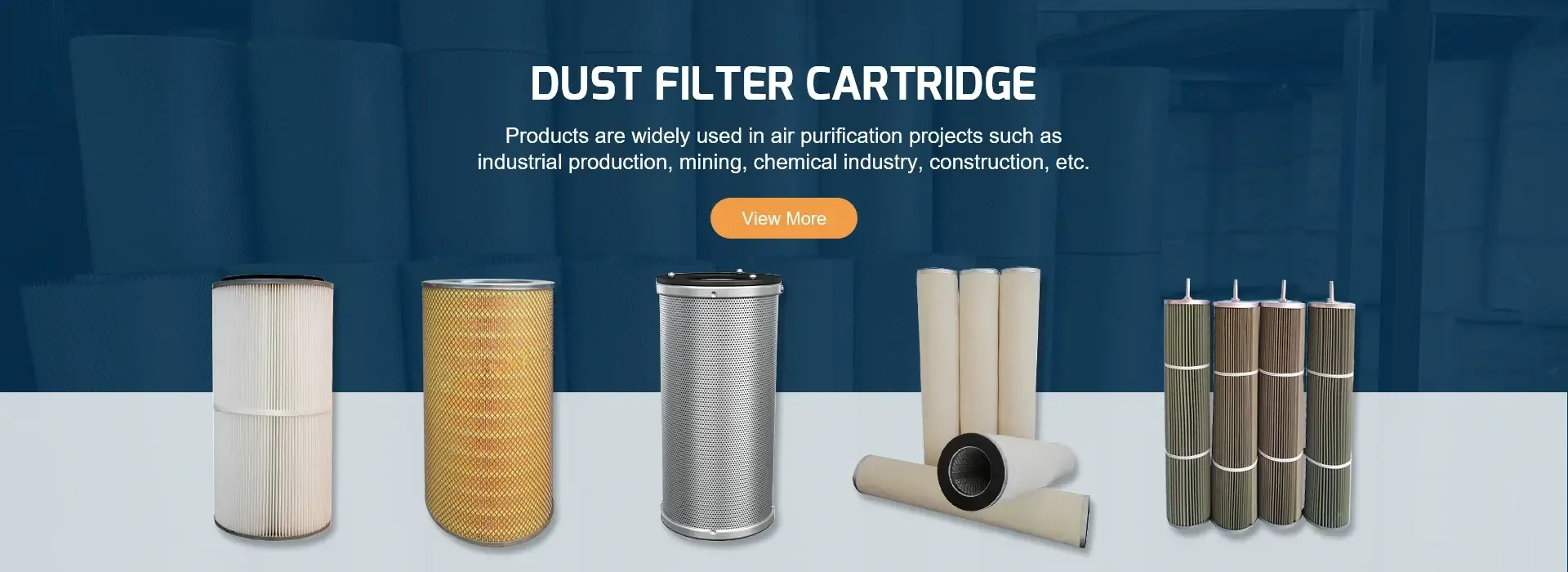 Tel:
+8615930870079
Tel:
+8615930870079
Nov . 06, 2024 14:08 Back to list
Effective Cartridge Filters for Industrial Dust Collection Systems and Applications
Industrial Dust Collector Cartridge Filters An Essential Component for Air Quality Management
In today’s industrial landscape, maintaining air quality is paramount for both environmental sustainability and worker safety. One of the most effective solutions for controlling airborne dust and particulate matter in manufacturing and processing facilities is the use of industrial dust collector cartridge filters. These filters play a critical role in ensuring clean air is circulated while minimizing health risks associated with dust exposure.
The Importance of Dust Collection
Industrial environments often generate substantial amounts of dust and particulates, which can lead to a variety of health issues for employees, including respiratory problems, skin irritations, and other chronic conditions. Moreover, excessive dust not only compromises air quality but can also affect operational efficiency and result in equipment wear and tear. As such, investing in a robust dust collection system is fundamental for any industrial operation that prioritizes a safe and healthy work environment.
What are Cartridge Filters?
Cartridge filters are a type of filtration media used in industrial dust collection systems. They consist of cylindrical filter elements that capture dust and particulate matter as air is drawn through them. These filters are typically made from advanced materials such as polyester, polypropylene, or fiberglass, which provide high filtration efficiency and durability. The design of cartridge filters allows for a compact and efficient dust collection process, maximizing the use of available space and minimizing the overall footprint of the dust collection system.
How Do Cartridge Filters Work?
The operation of cartridge filters in dust collectors involves several key steps
1. Airflow Induction The dust collection system uses a fan to induce airflow, drawing in contaminated air laden with dust and particulates.
2. Filtration As the air passes through the cartridge filters, the fibers in the filter material trap and capture dust particles. The design of the filters ensures that even the smallest particles are effectively removed from the airstream.
industrial dust collector cartridge filters

3. Cleaning Process Over time, the captured dust begins to accumulate on the filter surface, creating a layer known as a cake. While this can enhance filtration efficiency, it can also restrict airflow. For this reason, many systems incorporate an automatic cleaning mechanism, such as pulse jet cleaning, which intermittently blows compressed air through the filters, dislodging the dust and allowing it to fall into a collection bin.
4. Clean Air Exhaust After the particulates are filtered out, the clean air is then exhausted back into the workplace or environment, promoting better air quality.
Advantages of Cartridge Filters
Cartridge filters offer several advantages over traditional bag filters and other forms of dust collection systems
- Higher Efficiency Cartridge filters typically have a higher surface area-to-volume ratio, allowing them to capture more dust with a smaller filter size. This results in better filtration efficiency and longer service life.
- Space-Saving Design Due to their compact design, cartridge filters require less space than bulkier alternatives. This makes them suitable for facilities with limited available space.
- Easy Maintenance The simplified design of cartridge filters allows for easier installation, replacement, and maintenance. Many systems can be serviced without needing to shut down operations, which is crucial for maintaining productivity.
- Cost-Effectiveness While the initial investment in a dust collection system may be significant, the long-term savings in labor, maintenance, and health care costs can result in a favorable return on investment.
Conclusion
Incorporating industrial dust collector cartridge filters into an air quality management strategy is essential for modern industrial operations. By providing a reliable, efficient, and space-saving solution for capturing airborne dust and particulates, these filters contribute to a healthier work environment and enhanced productivity. As industries continue to prioritize environmental regulations and worker safety, the role of effective dust collection systems will undoubtedly remain critical. Investing in high-quality cartridge filters is not just a regulatory requirement; it is an investment in the health and safety of workers, and ultimately, in the success of the business itself.
-
Types and Applications of Air Filtration CartridgesNewsJul.28,2025
-
The Role of Gas Turbine FiltersNewsJul.28,2025
-
Mastering Air Filter Cartridge UseNewsJul.28,2025
-
Advanced Turbine Filters for Modern Gas TurbinesNewsJul.28,2025
-
Cellulose Air Filter Cartridge Advantages in Dust FiltrationNewsJul.28,2025
-
Cellulose Filters for Air Particle ReductionNewsJul.28,2025

 Email:
Email:





